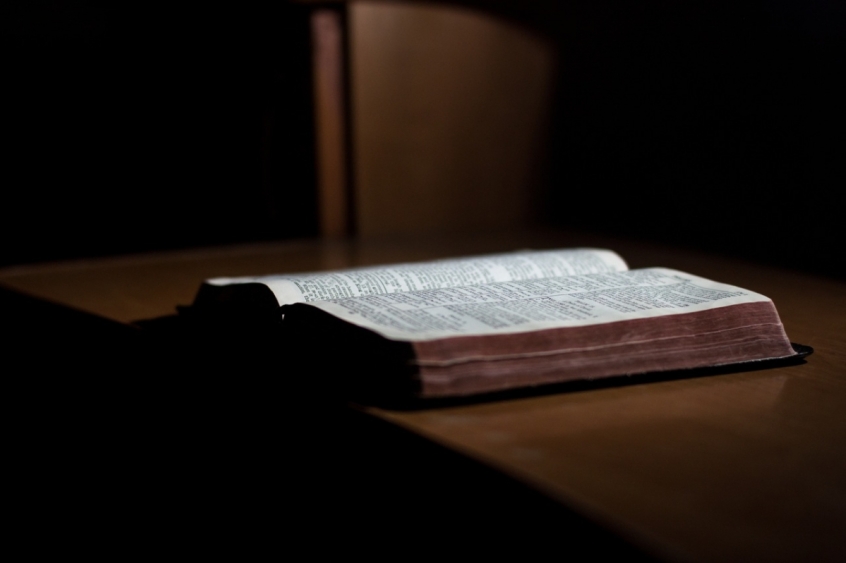
There are many things that are a mystery to us until the final big 'reveal'.
We might be reading a crime novel, for example – and the whole story only makes sense when we come to the closing pages and the identity of the murderer suddenly becomes clear to us.
The Bible is a bit like that. It's only when we get to the climax that we start to understand much of what has gone before. In our fortnightly pilgrimage through Mark's gospel we are now getting close to Jesus' execution. And as we do we shall see not only what it means for us today but how it ties up and explains so much of the rest of the Bible.
Here in today's section, in a seemingly innocuous few verses happening 'on the first day of the Feast of Unleavened Bread', Jesus tells his disciples to go ahead of him into Jerusalem where they will encounter a man carrying a jar of water (Mark 14v12-16).
They are to follow him, and then, at whatever house he enters, ask the owner about a guest room where Jesus can eat the Passover meal with his disciples. So, Mark tells us, the disciples 'set out and went to the city, and found everything as he had told them, and they prepared the Passover meal' (v16).
The casual reader might rush through these few verses. But the alert one will pick up on some clues which help explain the whole big picture of the Bible.
1. Clues from the references to feasts and festivities. It's no accident Mark mentions the annual Feast of Unleavened Bread. This was the celebration which reminded the Jewish people of how God had rescued them from slavery under Pharaoh in Moses' time – and how, when freedom came, their ancestors had to get out of Egypt so quickly they did not have time to put yeast in the bread they took with them, so that it remained flat or 'unleavened'.
Nor is it any accident that Jesus is about to be crucified at the time of the Passover meal. Every year the Jewish people would eat a special lamb to remind them of how, at the end of that time in Egypt, God told them to put the blood of a lamb on the door-frames of their houses. This was to function as a sign that they would be spared the final plague that God was bringing upon their oppressors, and that the angel of destruction would 'pass over' them.
Those Old Testament stories of oppression and deliverance, rebellion and liberation – and the commemorative festivities and rituals which result from them – are not there by chance. They all in one way or another deliberately foreshadow and point forward to the ultimate rescue which Jesus is about to undertake here in Mark's gospel: as the New Testament puts it, 'Christ Jesus came into the world to save sinners'.
2. Clues from the control which Jesus demonstrates in the events leading up to his death. Here, Jesus appears to have supernatural advance knowledge as he instructs his disciples to watch out for 'a man carrying a jar of water' (v13). Elsewhere, as commentators point out, he predicts both Peter's denial and Judas' betrayal.
Jeremy McQuoid writes: 'Jesus is not the unfortunate victim of circumstance as He approaches the cross. He is fully aware that he is laying down his life for the sins of the world'. That's because the Bible is not here reporting a series of random events – it is unveiling the final denouement of a story that has been unfolding gradually from its very earliest pages. No wonder 'they found everything as he had told them' (v16).
3. Clues from a remark Jesus makes almost in passing. As Jesus and his friends sit down to eat (about which we will think more next time), he comment, almost as a throwaway line, that 'the Son of Man goes as it is written of him' (v21). In those few words Jesus not only once again takes an Old Testament title from Daniel 7 (the 'Son of Man') and applies it to himself, but also claims once again that the Hebrew Scriptures were in fact pointing to him all along. It turns out that the story of the Bible was not after all about humanity's search for God – but about God coming in search of us.
Of course, the point of understanding all these things is not to gain more knowledge of what happened in our heads but to develop a greater knowledge of a person in our hearts. With most books, only a few readers ever get to meet the author. With the Bible, the whole point of the exercise is that the author is desperate to meet us, in person, through what we read. And so right now he waits, with love and open arms, for our response.
David Baker is a former daily newspaper journalist now working as an Anglican minister in Sussex, England. Find him on Twitter @Baker_David_A













